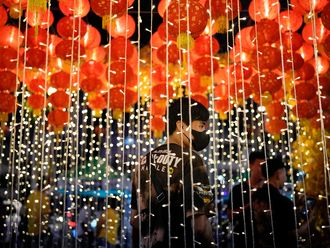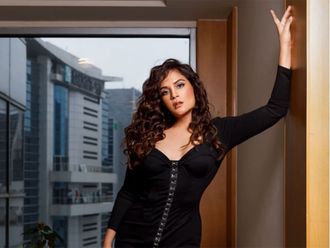It's no wonder Ukrainian customs include deft, dynamic dancing and steamy soups - you'd embrace these too if you had to live in this frigid European country. Shalaka Paradkar meets a few Ukrainians in the UAE to find out more about this fascinating nation.
"So you're here to see the performers?" asks Vlad Smetreakov, a genial giant of a man dandling an impossibly beautiful baby on his knee in a restaurant full of such odd charms.
He seems pleased to see me and so does his son, little Nikolai. It's before opening time at Troyka, and I am here to meet its troupe of Russian and Ukrainian dancers.
Smetreakov, 30, is the assistant manager of Troyka restaurant at the Ascot Hotel, Bur Dubai. He is as Russian as the Red Square, but informs me his staff is a mix of people from former Soviet republics.
While the dancers warm up on the kerchief-sized dance floor, there's plenty of time to soak in the ambience. The décor is an explosion of kitsch: gilded ceilings, painted Easter eggs, shelves stacked with matrioshka dolls, samovars displayed on corner shelves and wall frescos of a wintry countryside. The air is thick with the smell of cabbage wafting in from the kitchen.
In a few hours, this bewildering melange will transform into a rambunctious restaurant that features Cossack dances and the equally robust borscht soup - one of three places in Dubai to taste authentic Ukrainian food.
The dancers start their routine and Nikolai and I sit goggle-eyed with wonder. They jump, they twirl, they perform impossible acrobatic feats, before finally settling down for the interview perched upon each other's shoulders.
Actually, I just made that up, but by the end of it I'm slightly hysterical with both enjoyment and concern, since the ceilings seem too low and the floor too tiny to contain such exuberance.
Natasha Mulyka pooh-poohs my fears. All of 23, this Ukrainian woman has spent three months in Dubai and eight years training to be a dancer. As supple and wholesome as a field of harvest wheat, Mulyka says there is little she misses about Ukraine.
"Yes, I do get homesick sometimes, but my work keeps me busy. Every day I rehearse for five hours and perform from 9 pm onwards. On my days off, I prefer to sleep off the worries of the working week," she says.
Mulyka is joined by her colleague and compatriot, Roman Postolatiy. He isn't exactly new to the Middle East, having worked in Turkey for three years prior to coming to the UAE. They are two of the newest additions to the UAE's 2,000-strong Ukrainian expatriate community.
Getting on with the job
The word 'community' is used loosely in the case of the UAE's Ukrainians. They practise a range of professions - medicine, engineering, business, modelling, art and dance - but some of them feel they barely have time to meet, let alone form a sense of community.
"Sure, we are a significant number of people, but there is no Ukrainian community (as such) here," says Dr Sergei Vassiliev. "We are a work-driven people; it's the reason we are here. So you won't find Ukrainians socialising too much. There's no time. We prefer to stick to ourselves and get on with the job at hand."
However, there are some Ukrainian expats who find time to get involved in the wider community. Surgical oncologist, poet and artist, Dr Sergei is one who tries to give as much of himself as possible to the host country. He has been involved in numerous social and cultural events, winning acclaim for his paintings.
He and his wife, Dr Ludmila Vassilieva (in Ukraine, many women add an 'a' to their surname) practise a range of alternative therapies, including homeopathy, acupuncture, iridology, Chinese herbal medicine, Thai massage, yoga, Ayurveda and Oberon screening.
They're prepared to tackle most ailments and challenges - from a die-hard smoking habit to the after-effects of radiation.
The white and tangerine calm of the Holistic Healing Medical Centre, Umm Suquiem 2, beckons patients from all over the Middle East and the former Soviet Union. The clinic's colours are symbolic in part of the founder's roots. After all, orange is the colour of Ukraine's 2004 revolution, where people took to the streets after allegations of vote rigging in the federal election.
In November 2004, Ukraine's Orange Revolution was watched keenly by people across the world. Thousands of Ukrainians wearing orange marched into Kiev to declare their support for Viktor Yushchenko's Our Ukraine Party. After peaceful protests and a repeat election, Yuschenko became president, defeating Viktor Yanukovych.
Ukraine can be divided into a Russian-speaking, industrialised east that supports Yanukovych and a nationalistic, Ukrainian-speaking and predominantly agricultural west that supports Yushchenko.
In recent months, the country has been locked in a political stalemate since the March 26 parliamentary election ended without a decisive winner.
Like many Ukrainians, Dr Sergei's cultural identity is not so clear-cut. "It's difficult for me to define this since I'm half-Russian and from Donetsk, in the eastern part of Ukraine, where Russian is spoken as much as Ukrainian," he says.
The mighty Kyiven Rus
The predecessors of modern Russians, Belarusians and Ukrainians were the Rus people, who in the ninth century established Ukraine as a trading centre, dealing in amber, fur, silk, gold and other commodities.
By the 10th and 11th centuries, the Ukraine state of Kyiven Rus (centred on modern-day Kiev) had grown into the largest state in Europe. However, Mongol invasions in the mid-13th century led to the region's demise.
In the 16th and 17th centuries, Ukraine was ruled by Poland, but the 1648 Cossack war of independence ended this. However, sovereignty was short-lived and most of the region came under Russian and Austrian rule during the 17th century.
Following the 1917 Bolshevik Revolution, several separate Ukraine states emerged, but were quashed within a few years.
In fact, after the Soviet-Polish War ended in 1921, most of Ukraine fell under Soviet rule and the following year Ukraine was declared a Soviet republic. It became an important industrial and agricultural region of the Soviet Union, often referred to as its 'bread basket'.
The fall of communism
When the Soviet Union collapsed in 1991, Ukraine again witnessed a resurgence of nationalism.
"Almost overnight, there was a flowering of indigenous Ukrainian art, culture, music and literature. During Soviet rule, we were banned from singing our folk music and speaking Ukrainian.
"But once the Soviet Union collapsed, it was as if that ban had never existed, as all over Ukraine, people went back to celebrating their Ukrainian identity," says Svitlana Osobik, a Dubai-based painter.
We are sitting in her Al Baraha studio, a cosy space dominated by her canvas, Kyiv Rus. In this painting, Osobik explores her deep emotional connection with Ukraine.
Mostly it is a nostalgic reminiscence of its glories - when it was one of the greatest countries in medieval Europe. The painting is rendered in blue to represent Ukraine's open skies and nascent freedom.
Its icy overtones and depictions of snowfields speak of Osobik's nostalgia for Ukraine's pristine winters. Most startling are two blue and orange blazes above the prow of Viking ships.
"It's a reference to the origin of Ukraine and its people, and how the Rus first entered the region, effectively creating Kyiv Rus," says Osobik. (That said, academics hotly debate the origins of the Rus; some claim they were Slavic not Scandinavian.)
With independence came the freedom to worship in churches again. Festivals such as Easter began to be celebrated with the same pre-communism gusto.
Maryna Maschewsky, 25, a Ukrainian housewife married to a German, Dieter Maschewsky, recounts the Easters she would spend at home.
"On Sunday morning, we went to church with a basket containing Easter cake, painted eggs, butter and cheese and got the food blessed. I remember how onion skins were collected all through winter and then boiled in water. The eggs were then plunged into this water to colour them. That's the kind of egg decoration I do to make pisanka (painted Easter eggs) in Dubai," she says.
While independence may have been good for Ukrainian culture, it has been hard on its people.
Despite a wealth of natural resources, being industrialised and having a high standard of education, Europe's largest country is in economic decline.
One of the offshoots of this has been migration of its citizens to countries with better opportunities.
The Chernobyl catastrophe
With the 1986 Chernobyl nuclear plant disaster, the world's attention focused on Ukraine and Kiev. Yet amid the tragedy were tales of inspiration.
Dr Ludmila treated some 250 children affected by radiation using homeopathy.
Ukrainians have long employed this method of treatment, which espouses that "like cures like". In the 19th century, homeopaths were supported by some prominent Ukrainian personalities and during this period, homeopathy societies were founded in Kiev, Kharkov, Odessa, Poltava and Chernigov.
Drs Ludmila and Sergei are heirs to this tradition of homeopathy and use it to treat everything - from allergies and asthma to the after-effects of radiation and chemotherapy.
Lush landscape
"The best things about Ukraine are its famously fertile soil and its equally famous beautiful women," says Dr Sergei. Dubai-based concert pianist Elena Von Haefen says despite her homeland's physical beauty, life is difficult there.
"There are not many things in Ukraine that I am attached to, apart from my family. The economic situation has made life difficult," she says. "Ever since I was a child, all I wanted to do was leave the country.
"To be honest there's absolutely nothing that makes me homesick about Ukraine. I try to see my family as much as I can, but there's nothing else in Ukraine. I was born in Ukraine, but didn't live there for long. I lived in Russia, then Switzerland and have been in Dubai for the past eight years," she says.
But despite a dismal socio-economic scenario, she says there is no denying the beauty of Ukraine.
"It's the most picturesque country, with awe-inspiring natural beauty. But everyone has forgotten how scenic it is, because when you're going through so much trouble, appreciating the scenery is the last thing on your mind."












